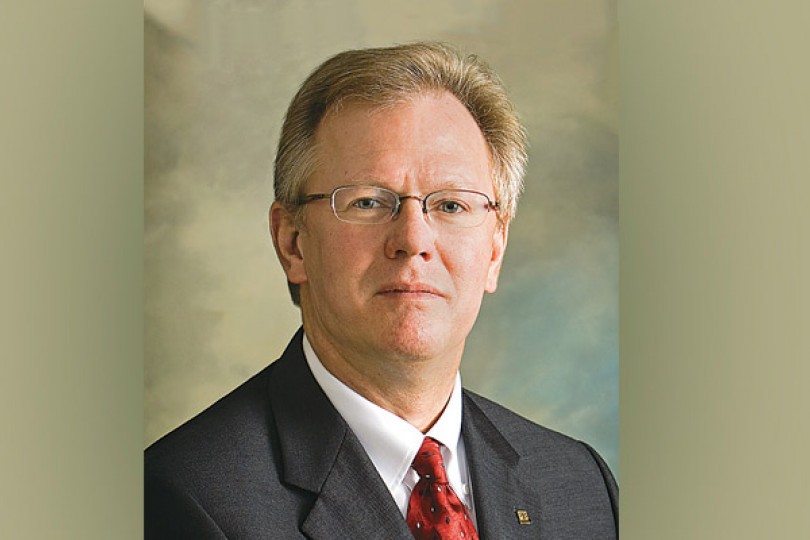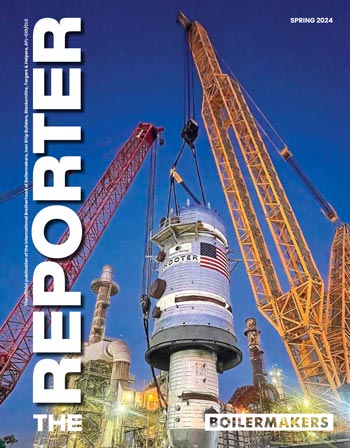U.S. must re-assess its path to reliable energy
ACROSS THE NATION, thousands of good-paying jobs are disappearing and the communities that depend on them are withering as scores of coal-fired power plants shut their doors. The plants, and the working families and businesses whose livelihoods are tied to them, are victims of a powerful alignment of external forces: virulent environmentalism, a slow economy, strict new EPA regulations, and soaring competition from natural gas.
The Boilermakers union has been a leader among the labor and business organizations that seek to shepherd the coal-fired energy sector through the worst effects of these forces. And we continue in those efforts.
Energy generated from coal has long been the driving force behind our manufacturing strength and our prosperity as a nation. Recent decades have witnessed remarkable strides in reducing the environmental impact of coal emissions, and our field construction members have been at the forefront of those achievements. Advanced technologies hold the promise of the cleanest coal use yet.
With 200 years of reserves and the infrastructure in place to produce coal-fired electricity reliably and economically well into the future, it does not make sense to abandon this valuable resource. We are on the cusp of world leadership in clean coal technology. It would be foolish to cede that leadership to other countries — particularly China and India — that are quickly ramping up their coal use.
Sierra Club pushes dangerous fantasy for electric power
THE SIERRA CLUB has declared war on coal, publicly calling for the closure of every coal-fired power plant in the nation. Through litigation and public relations campaigns, it has sought to stop the construction of advanced new power plants that are among the cleanest in the world.
The group is even calling for a halt to all coal mining in the United States, a demand that, if met, would destroy tens of thousands of good union jobs and do major harm to communities that have developed around mining.
The extreme posture of the Sierra Club has distorted the national debate over energy policy and has resulted in wasted resources as energy providers contend with lawsuits at every turn.
The club’s notion that the United States can simply close some 600 coal plants and replace them with solar and wind power is delusional. The massive build-out of solar and wind power facilities required to achieve the same output as coal generation would take decades to achieve. And extensive new infrastructure would be required for transmission lines. Environmental groups are already filing lawsuits against some solar and wind projects because they, too, have environmental consequences. Imagine the nightmare of litigation should such projects multiply a thousand-fold to replace coal.
Some experts assert that even if enough wind and solar facilities could be constructed, as much as 90 percent of the power they produced would need to be duplicated by conventional power plants as a back-up to the intermittent nature of these alternative power sources.
It is not too late for Congress to save coal from further constriction.
The truth is that every energy source, including coal, natural gas, nuclear, wind, solar, thermal, hydro, and tidal, carries certain limitations and environmental considerations. Even the new darling of electric power — natural gas derived from shale — has its own environmental issues, including the release of methane, a much more potent greenhouse gas than carbon dioxide. Demonizing coal or any other energy source is not the answer. If the United States is to see an economic resurgence, we will need every component in our energy portfolio — and the technological advances to continuously optimize their use.
Environmental groups seem not to care about the consequences of killing off the nation’s base load energy supply. They have virtually eviscerated nuclear power development. Their aggressive attacks on coal are being followed by efforts to stop natural gas mining using hydraulic fracturing, or “fracking.” Without these base load energy sources, America’s energy production would become entirely unstable and unreliable, and our economy would suffer grievously for it.
Congress should act to relax overly-stringent EPA rules
NEW REGULATIONS developed by the Environmental Protection Agency are so restrictive and so costly that they practically ensure the decline of coal-fired energy. Two of the most costly EPA regulations include the following:
- Cross-State Air Pollution Rule (CSPAR) — requires reduction of sulfur dioxide and nitrogen oxide; and
- Mercury and Air Toxics Standards (MATS) Rule — as it’s name implies, requires reduction of mercury, particulate matter, and such toxics as arsenic, acid gas, nickel, selenium and cyanide.
Still other EPA regulations concern coal ash handling, cooling towers, and surface mining.
Some of the emissions targeted by these regulations are already being handled by environmental control technologies. According to the National Energy Technology Laboratory, modern coal-fired plants emit 90 percent less sulfur dioxide, nitrogen oxide, particulates, and mercury than the plants they replaced from the 1970s.
Many in the energy industry argue that the positive health effect of enacting further rules is so minimal that the extreme cost cannot be justified.
Perhaps the most severe regulation to be promulgated by the EPA requires new coal-fired plants to reduce CO2 emissions by more than 40 percent, essentially matching the emission levels of natural gas-fired plants. That requirement means every new coal-fired plant (except those that begin construction within a 12-month window of the rule’s enactment) would have to incorporate carbon capture and storage technology. However, this technology has not been commercially demonstrated and will not be economically viable for the foreseeable future. In essence, the EPA is making a requirement that new plants employ technology that is not ready for deployment.
Steve Miller, the CEO and President of the American Coalition for Clean Coal Electricity, stated that the new rule for CO2 “will make it impossible to build any new coal-fueled power plants and could cause the premature closure of many more coal-fueled power plants operating today.”
U.S. Senator Joe Manchin (D-W. Va.) expressed anger about the series of EPA rules targeting coal, stating, “This EPA is fully engaging in a war on coal.”
The governor is right to be angry about the severity of the EPA rules. But let’s not forget that it was up to the U.S. Congress several years ago to enact legislation governing how we deal with greenhouse gases — and it failed to do so. The Brotherhood’s late Legislative Director, Abe Breehey, had helped fashion a sensible strategy to put a price on carbon dioxide to promote industry-wide improvements in emissions and prevent the rampant, job-killing plant closings we are seeing today. Unfortunately, conservatives in the Senate blocked the plan.
Absent new legislation to deal with greenhouse gases and directed by a 2007 Supreme Court decision to treat CO2 as a pollutant regulated under the 1990 Clean Air Act, the EPA has undertaken steps to establish rules as it sees fit. And we are feeling the pain of those rules today.
It is not too late for Congress to create new greenhouse gas legislation that will provide certainty in the industry and save coal from further constriction. The strategy championed by Abe Breehey remains workable and deserves to be considered.
There are still thousands of good blue-collar jobs that can be saved. There are still scores of communities that can be spared the ravages of a major employer closing its doors. And there are still compelling reasons to keep coal as a major source of energy.
Environmental groups will perhaps always be at war with coal, but if Congress does its job, the EPA need not be. Congress can give the agency a new framework upon which to develop regulations. That framework should be much less severe and should set the stage for a healthy coal industry that continually advances as emissions control technology evolves.







